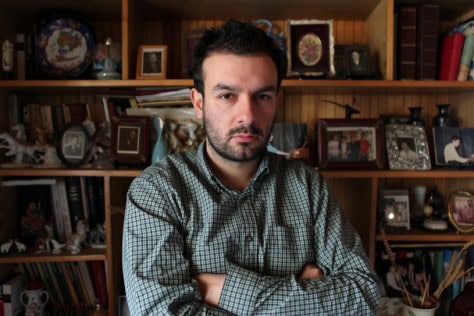Fresh off the release of Southport Weekender Vol. 7, a two-disc mix he did with Jazzanova, Mr. Scruff chatted with Anthem about DJ'ing, the confusing marketing of MP3s, and embracing the younger generation of DJ's. Read on for the full discussion.
So, you recently put out a two-disc mix with Jazzanova, Southport Weekender Vol. 7—could you tell me a little about that?
Basically, the Southport Soul Weekender is a mostly soul, house, hip-hop, and street soul event that's been running for about twenty years now, and both Jazzanova and I have been playing there quite frequently in recent years. It happens twice a year. We were both asked to do a mix—it's a two-disc release so Jazzanova did a mix and I did a mix—and… my mix just reflected a wide range of all the soul music that I'm into and also the sort of stuff I play when I'm DJ'ing the Southport Soul Weekender.
I like the mix—it's really nicely sequenced and very refreshing. Like you were saying, it's thematic, so I'm wondering if that's usually how you approach DJ'ing, with themes or goals in mind.
Not really, no. Because I'm a resident DJ, I get to play whatever I want, really—I'm very fortunate in that respect. Pretty much 95% of the gigs I do, I'm DJ'ing all night, and I get to play everything, be it soul, funk, hip-hop, jazz, Afro stuff, Latin, blues, kind of psychedelic stuff—anything really—and the Southport thing is actually nice once in a while because I arrive and say, “alright, I'm going to play just this one genre.” Although within the whole umbrella of soul music, there is a whole lot of different music (it's been around for over forty years now). It's something different to me, but a lot of that stuff, I play at my normal gigs, so it was just me bringing all that soul stuff together.
I really like the length of it. It's pretty long. There're too many mixes and sets that're really short! How do you manage to stay up at the turntables for such a long time?
Well, I get asked a lot of that at gigs. And what I usually say to people, especially when they're at the clubs, “well, you've been dancing for six hours—which is the more energetic?” [laughs]. Most people sit in an office for eight hours a day, and they might have a break, and I mean, I work at a place that has a lot of energy and people are enjoying themselves… For sure you've gone out many nights where four or five hours have flown by without you even noticing. That's the same thing for me. I'm enjoying myself as much as anyone else there. And the first hour or two, if you play an all-nighter, it's really mellow, anyway, and you can put on some long jazz records and just relax and have a cup of tea. Almost like warming up and limbering up. I suppose that's why the early part of the night's called the warm up. It's not really a big deal. I suppose before, in the late-80s, most DJ's played all night, anyway… and then they would sweep the dance floor after. Those were the days when being a DJ was just like being a member of the bar staff. It might be unusual now, but it's a very traditional way of DJ'ing. Anyone DJ'ing thirty, forty years ago would've probably played say, ten hours a night, five or six days a week. So that's hardcore. What I do is hardly a feat of indurance.
Even if you're not doing five, six sets a week and eight hours a night, is it ever difficult for you to keep everything fresh? Do you consciously avoid repetition or look at a record and say, “I played that last time—I can't do it again”?
I think that if I'm playing a residency or something—I have a residency in Manchester that I play every month, for instance—if it's a record that I don't think anyone else is playing or… well, a lot of the music I play, people won't have heard it anywhere else. I mean, I play a lot of old school music, but from a lot of genres. So if you're really into soul music, I might play some African music you've never heard before or some reggae. And anyone needs two or three listens to get into a tune properly. I've nothing against playing records over and over again if I'm really excited about them. I think it's when you get sick of the record, that's when it's time to stop playing it.
Then again, I don't really play set sequences of records, either. I like to get very relaxed and feel at home and then [I] can just go where the mood takes [me] without thinking, “I've got to play this and this in this order.” If you do your preparation and relax…
I'm really interested in the whole process of DJ'ing and doing what you do. When you're getting ready to go to a gig, it's not like you bring more than four or five crates of records and how do you choose that stuff beforehand?
Um, about four or five, usually. I bring about that much to every gig. I mean, in… six hours, you're probably not going to play more than one or one-and-a-half crates of records. Even if you're taking four, that's probably a bit too much choice. I just take a lot of records so that if I don't play them that night, I'll probably play them the next. I like to take more than I need because… if I feel like playing three hours of reggae, I can or if I want to do a whole hour of Latin or African stuff, I can. I do enjoy taking a lot of records. I mean, every week, you take a few records out of your crate and put a few more in… I don't really have to take different crates to different gigs. Every week, I just take some out and add some more just to keep it interesting and fresh as well.
Generally speaking about DJ stuff right now, it seems like there're a lot of DJ's who have been established over the past ten, fifteen, twenty years who are sort of changing what people expect from DJ's. There seems to be an aversion in certain communities from Serato and computer DJ'ing and that style…
I've no idea, really. Music's always interesting [in that regard] because you'll always have people who have been [working] for twenty, thirty, forty years, and then you'll have young teenagers coming up and bringing a lot more energy to it. I think that mixture keeps things fresh. I really enjoy [how] every two or three years, you'll have a new crop of DJ's who are really inventive or [working] from a different perspective. And often times they play music you've grown up with, but use it in a completely different way. That's good [in order to] keep the older generation on their toes. I'm thirty-six now so I'm not as old school as a lot of DJ's out there, but I've been out there for a while. I think it's very good to keep an eye out on what's going on, though, and treat any newcomers as friendly compeition. It's good to be fans of people half your age as well… and nobody knows it all. I even pay attention to wedding DJ's… a totally different scale. The art of DJ'ing has a lot of different angles and aspects to it.
Well, there's certainly been a change in the past five years or so where these things are recorded way more often and spread across the entire globe instead of being kept in one city or one community. It doesn't matter what the location is… it's ways easier to see what other people are doing and sort of compare and contrast.
Yeah, that's good. But I mean… you don't really get mixes on the radio anymore, though. You get a bit, but nothing like twenty or thirty years ago. I think the Internet is just a different way of getting the same information, but the information gets passed around quicker. So things influence other things a lot quicker—which is fine, technology isn't a bad thing. Someone in L.A. can listen to a mix that was recorded in Paris like, two hours after the gig—cool. That's great. Generally, all the other ways of listening to new music in terms of more mainstream media like radio and T.V. and stuff are being so dumbed down that [the Internet] is almost a solution to the problem. Hopefully, the ease in obtaining all this music doesn't actually reduce people's enjoyment or excitement.
In general, has there been any change for you in terms of merketing yourself or interacting with your audiences or working with new technologies?
Over the past two years, I've done a lot more mixes for online radio stations and stuff like that. This year, I've released quite a lot of singles, but I make sure I always do vinyl as well. So yeah, kind of. I've adapted to new technology, but I'm still pretty old school. I make sure that people who do like physical formats are allocated for as well because that's my personal preference. Everybody's lives have changed over the last few years.
Well, is it ever a struggle for you, coping with the new mediums… having to compress your audio for iTunes and stuff like that?
Not really. I mean, I guess MP3s are convenient, but they're not a professional format. My next album… that's not coming out on vinyl, but I'm making sure that most of the tracks will come out separately on 12″s. I suppose it's sort of a reaction to people's attention spans [going down] a bit. But it's still got to be loud and on a 12″ for DJ's. I think that by putting all of [my tracks] out separately allows people to pick and choose—the same way they pick and choose with music downloads and shit—but keep it simple. And then when people do hear vinyl, [they] realize it has better sound than MP3s or [poorly] mastered CDs. It's definitely important for me to maintain that vinyl presence.
The engineer I've been working with said that a lot of people have been cutting vinyl [recently]… the new generation has come along and sort of rediscovered the format. I'm not one of these people who says, “well it's CD versus vinyl” or “digital versus analog” or anything. If it sounds alright, I don't mind. Why can't you have both? What's the problem? And some things sound better on CD, some things sound better on vinyl. I think I'd rather listen to an album on CD just so that I don't have to keep getting up and changing it.
I'm kind of curious to see if there's going to be a CD resurgence in the future…
Yeah, possible. It depends on how important sound quality will be in the coming years. In the last few years, [labels] have been selling really low quality MP3s and convincing people that it's better than CD when it's basically not. With that kind of advertising budget, you can sway people that a McDonald's shake tastes better than champagne. It's a lot of that, really. On the same line, you've had all these surround sound… T.V.s being made and it's like, well, how can people listen to music in really bad quality yet expect amazing sound quality from their T.V.? I think that people will start to pick up on the fact that MP3s don't sound anywhere near as good as good quality CDs or vinyl.
 Q&A with Larry Gus
Q&A with Larry Gus We Own the Night: The Edison
We Own the Night: The Edison
No Comments